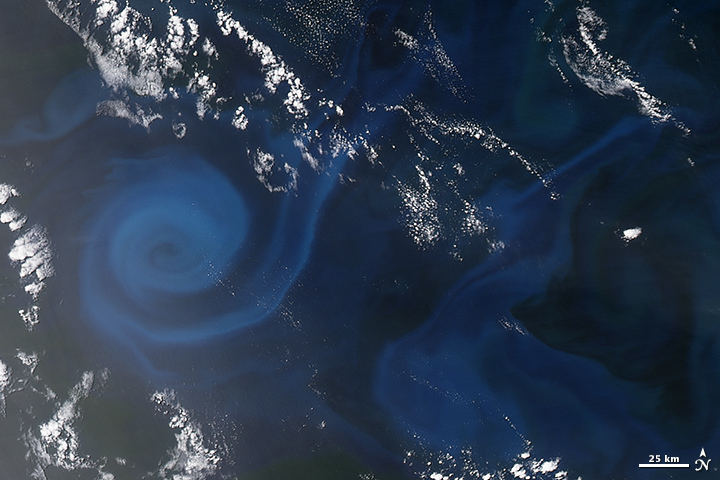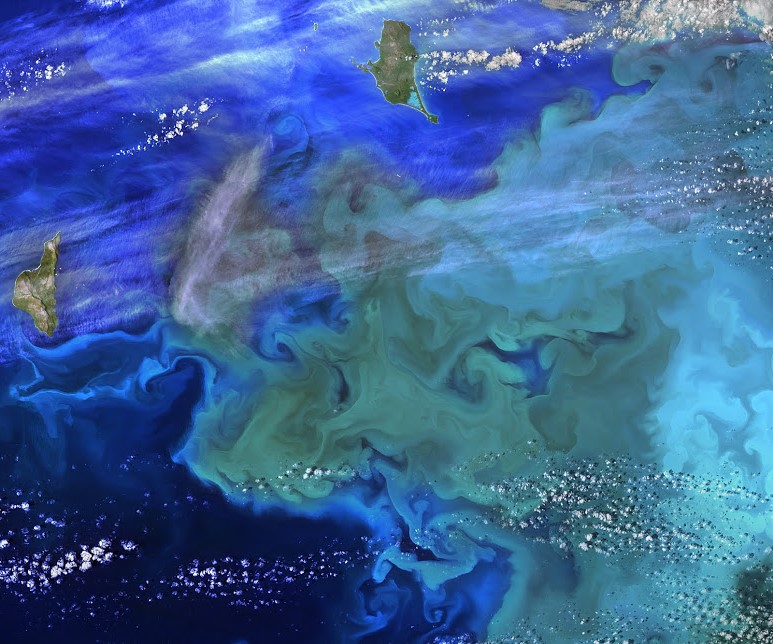File:Phytoplankton.jpg: Difference between revisions
Siterunner (talk | contribs) No edit summary |
Siterunner (talk | contribs) No edit summary |
||
| Line 5: | Line 5: | ||
[[File:Plankton Phytoplankton--'Climate Dance'.jpg]] | [[File:Plankton Phytoplankton--'Climate Dance'.jpg]] | ||
Phytoplankton obtain energy through the process of photosynthesis and must therefore live in the well-lit surface layer (termed the euphotic zone) of an ocean, sea, lake, or other water. Phytoplankton account for half of all photosynthetic activity on Earth... | |||
Phytoplankton are responsible for much of the oxygen present in the Earth’s atmosphere – half of the total amount produced by all plant life. - http://en.wikipedia.org/wiki/Phytoplankton | |||
○ | |||
Marine Biodiversity Strongly Linked to Ocean Temperature | |||
ScienceDaily / 2010 — In an unprecedented effort published online by the international journal Nature, a team of scientists mapped and analyzed global biodiversity patterns for over 11,000 marine species ranging from tiny plankton to sharks and whales. | |||
The researchers found striking similarities among the distribution patterns, with temperature strongly linked to biodiversity for all thirteen groups studied. These results imply that future changes in ocean temperature, such as those due to climate change, may greatly affect the distribution of life in the sea. | |||
http://www.sciencedaily.com/releases/2010/07/100728131707.htm | |||
○ | |||
Plankton | |||
2015 - Big Trouble Ahead for Ocean Plankton | |||
Sobering news: Ocean acidification will likely kill off some phytoplankton species and let others thrive, while warming waters will likely cause mass phytoplankton migrations toward the poles. In short: The base of the marine food web could be in for some serious upheaval in the coming decades. Here’s more from MIT News: | |||
“I’ve always been a total believer in climate change, and I try not to be an alarmist, because it’s not good for anyone,” says (Dr. Stephanie) Dutkiewicz, who is the paper’s lead author. “But I was actually quite shocked by the results. The fact that there are so many different possible changes, that different phytoplankton respond differently, means there might be some quite traumatic changes in the communities over the course of the 21st century. A whole rearrangement of the communities means something to both the food web further up, but also for things like cycling of carbon.” | |||
Dutkiewicz and her colleagues studied 154 published experiments... | |||
Phytoplankton Dutkiewicz article avail via 'Nature Climate Change' scientific journal publ.png | |||
Revision as of 22:54, 30 October 2015
https://en.wikipedia.org/wiki/Diatom
Phytoplankton obtain energy through the process of photosynthesis and must therefore live in the well-lit surface layer (termed the euphotic zone) of an ocean, sea, lake, or other water. Phytoplankton account for half of all photosynthetic activity on Earth... Phytoplankton are responsible for much of the oxygen present in the Earth’s atmosphere – half of the total amount produced by all plant life. - http://en.wikipedia.org/wiki/Phytoplankton ○ Marine Biodiversity Strongly Linked to Ocean Temperature ScienceDaily / 2010 — In an unprecedented effort published online by the international journal Nature, a team of scientists mapped and analyzed global biodiversity patterns for over 11,000 marine species ranging from tiny plankton to sharks and whales. The researchers found striking similarities among the distribution patterns, with temperature strongly linked to biodiversity for all thirteen groups studied. These results imply that future changes in ocean temperature, such as those due to climate change, may greatly affect the distribution of life in the sea. http://www.sciencedaily.com/releases/2010/07/100728131707.htm ○ Plankton 2015 - Big Trouble Ahead for Ocean Plankton Sobering news: Ocean acidification will likely kill off some phytoplankton species and let others thrive, while warming waters will likely cause mass phytoplankton migrations toward the poles. In short: The base of the marine food web could be in for some serious upheaval in the coming decades. Here’s more from MIT News: “I’ve always been a total believer in climate change, and I try not to be an alarmist, because it’s not good for anyone,” says (Dr. Stephanie) Dutkiewicz, who is the paper’s lead author. “But I was actually quite shocked by the results. The fact that there are so many different possible changes, that different phytoplankton respond differently, means there might be some quite traumatic changes in the communities over the course of the 21st century. A whole rearrangement of the communities means something to both the food web further up, but also for things like cycling of carbon.” Dutkiewicz and her colleagues studied 154 published experiments...
Phytoplankton Dutkiewicz article avail via 'Nature Climate Change' scientific journal publ.png
File history
Click on a date/time to view the file as it appeared at that time.
| Date/Time | Thumbnail | Dimensions | User | Comment | |
|---|---|---|---|---|---|
| current | 22:51, 30 October 2015 |  | 600 × 600 (97 KB) | Siterunner (talk | contribs) | https://en.wikipedia.org/wiki/Diatom |
You cannot overwrite this file.
File usage
- Biodiversity
- Earth360
- Earth Law
- Earth Observations
- Earth Science
- Earth Science from Space
- Ecology Studies
- Environmental Full-cost Accounting
- Environmental Security, National Security
- EOS eco Operating System
- Externalities
- ISS
- Land Ethic
- New Space
- Oceans
- Ocean Ecosystem
- Ocean Science
- Ocean Sustainability
- Planet Citizen
- Planet Scientist
- Planet Citizens, Planet Scientists
- Solar Energy
- Sustainability
- Sustainability Policies
- ThinBlueLayer
- Atmospheric Science
- Biogeosciences
- Climate Change
- Cryosphere
- Geophysics and Geochemistry
- Mineralogy
- Geology
- Geophysics
- Hydrology
- Natural Resources
- Planetary Science
- Space Science and Space Physics

